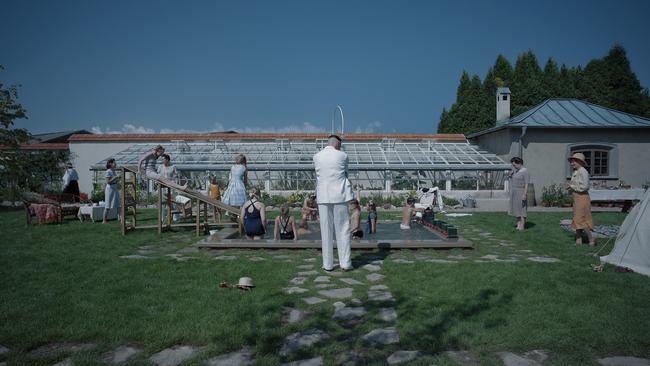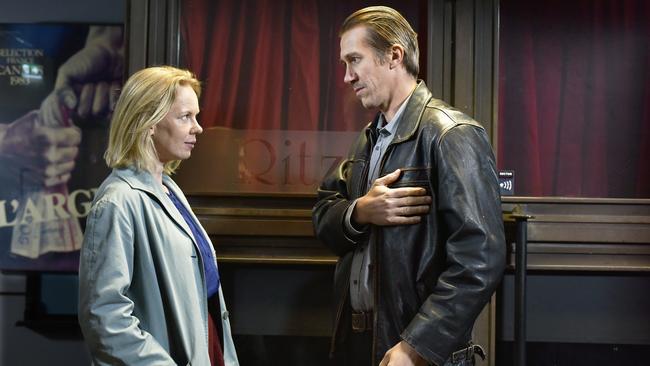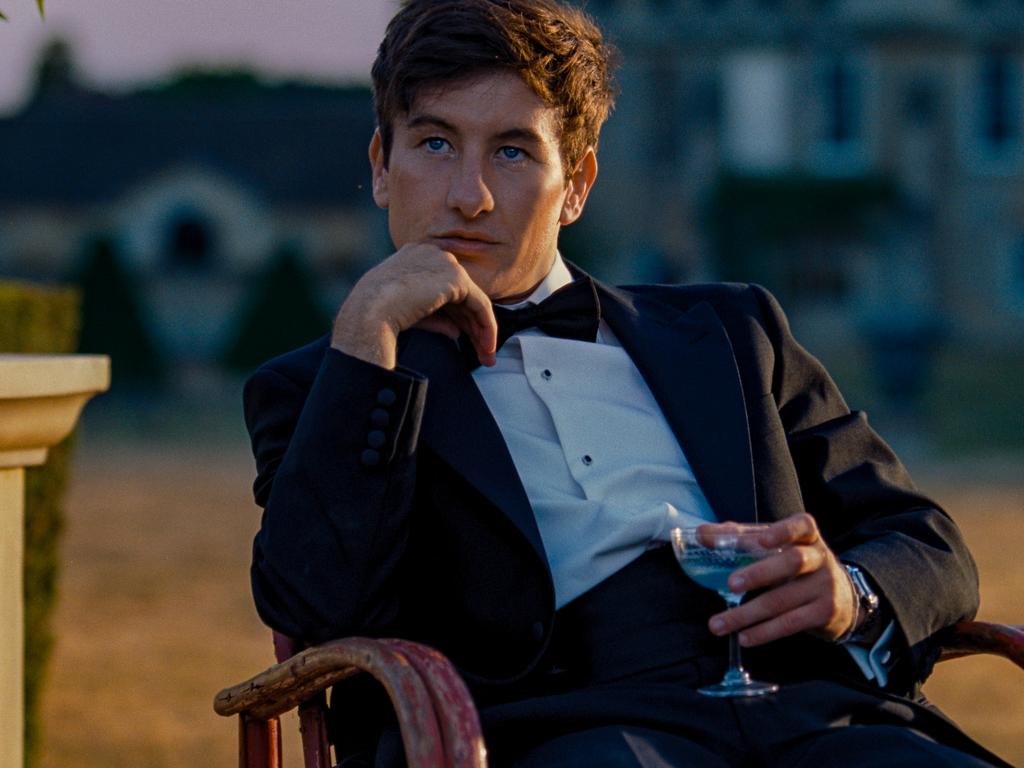The Zone of Interest will hold you in a morbid spell
There is not one scene shot inside Auschwitz. We do not see one camp inmate. Instead we hear what is going behind that wall: dogs barking, gunshots, orders delivered, people screaming.

The Zone of Interest (M)
German language with English subtitles
106 minutes
In cinemas. Advance screenings ahead of national release on February 22
★★★★½
‘Burn. Cool. Unload. Reload.” This is how the benefits of a new incinerator system are matter-of-factly put to Rudolf Hoss, commandant of the Auschwitz concentration camp in Nazi-occupied Poland, in the Holocaust drama The Zone of Interest.
Hoss (Christian Friedal from the ongoing television series Babylon Berlin) approaches his job with cold methodology. He is dealing with units – of production, of waste – rather than human beings.
He’s so good at what he does that one of his fellow Nazis, responsible for a different part of their business model, starts to fret. He’s reassured by a comrade: “He won’t put them all up the chimney. You’ll get your workers.”
There are so many great films about the Holocaust, from Claude Lanzmann’s Shoah to Steven Spielberg’s Schindler’s List to Robert Benigni’s Life is Beautiful to Roman Polanski’s The Pianist, that it can be fairly asked what a new movie will add to this terrible moment in human history.
The Zone of Interest, a German language film written and directed by English filmmaker Jonathan Glazer, more than answers that question. It is an extraordinary piece of filmmaking from the opening credits to the closing ones.
Indeed the credits go to a key element of this film.
The English sound designer, Johnnie Burn, is essentially the co-director. Glazer has described the sound as “the other film”.
When the opening title, The Zone of Interest, fades out, like a life perhaps, we see nothing but a black screen for a long time – several minutes – and then we hear birdsong.
The screen bursts into colour and we see a family frolicking, swimsuits on, in a peaceful riverside setting. This is Hoss, his wife Hedwig (the incredible German actress Sandra Huller, also in Anatomy of a Fall at present) and their five children.
This river runs beside the purpose-built estate, complete with a swimming pool, that they live in. It is next door to the concentration camp. From the yard, the barbed wire, the watchtowers and the chimneys bellowing smoke are visible.
Hedwig, a keen gardener, is growing flowering vines over the wall that almost abuts the camp. When her mother visits, she assures her the young women doing the household chores are locals. “The Jews are on the other side of the wall.”
We, the viewer, do not see past that wall. There is not one scene shot inside Auschwitz. We do not see one camp inmate. Instead we hear what is going behind that wall: dogs barking, gunshots, orders delivered, people screaming.
We see the Hoss family going about their happy lives inside their house and in their garden, asking their husband and father to make sure he brings home treats such as diamonds and chocolates taken from the Jews. Away from home, we see Hoss and his fellow Nazi careerists working out how to kill a maximum number of Jews while still having enough slave labour to win the war. These moments, around boardroom tables, are particularly chilling.
Friedal is convincing as the stoic, results-first Nazi and Huller is compelling as the “Queen of Auschwitz”, as her friends call her. Throughout the sound, and the musical score by Mica Liva, holds us in a morbid spell. We know the story, but we are seeing it, hearing it, from a different perspective.
Glazer’s script is a loose adaptation of Martin Amis’s 2014 novel of the same name. While Amis uses fictional names for the Hosses, Glazer uses their real names. He has said he did not want to fictionalise in any way what happened.
Glazer’s 2000 debut film was the offbeat crime drama Sexy Beast, starring Ray Winstone and Ben Kingsley. He followed that with the psychological drama Birth (2004), starring Nicole Kidman, and the alien thriller Under the Skin (2013), based on Michel Faber novel and starring Scarlett Johansson.
The Zone of Interest has been nominated for five Oscars, including best director, best adapted script, best international film and, one it should win, best sound. Burns is also the sound designer on Yorgos Lanthimos’s Poor Things, so he’s had a good year.
The inside of Auschwitz does appear once in this film but not in its historical concentration camp setting. Towards the end we see, without explanation, cleaners toiling away.
It soon becomes apparent where they are polishing the glass and vacuuming the floor: the Auschwitz memorial and museum.
We see the shoes, an almost countless number, almost carelessly stacked in a display case.
This is not the end of the film. It is a perfectly placed, present-day reminder of how it did end for more than six million people.
Weeds that stifle the seeds of love
That the Finnish language film Fallen Leaves is being released on Valentine’s Day must be some sort of in-joke as it’s one of the saddest love stories I’ve seen in a while.
Then perhaps that’s the tongue-in-cheek point. If you see this film, you’ll think your own love life isn’t half bad.
Don’t get me wrong. This is a well-directed, well-acted, interesting, entertaining and at times humorous movie, just not in a feelgood way. It could be billed as an unromantic deadpan comedy. This is especially true of the soundtrack, which ranges from Schubert to melancholic love songs that feature cold hearts, broken souls and teardrops in never-ending rain. I did laugh out loud at the lyrics.

Set in the Finnish capital, Helsinki, this movie is written and directed by Aki Kaurismaki. At heart it is a story of loneliness, one in particular to the low-paid, easily-sacked working class.
It’s the fourth instalment in Kaurismaki’s Proletariat series, which makes me think of him as a Finnish Ken Loach. However, the characters in the British filmmaker’s exploration of blue collar life are more cheerful. Who would have thought that?
Ansa (Alma Poysti) works in a supermarket. She lives alone, has a single bed and eats microwave dinners. Her only company is the radio, which broadcasts regular updates about the war in Ukraine. When we see her sitting on the tram en route to work she looks pretty but ground down and washed out.
Holappa (Jussi Vatanen) works as a sandblaster in an industrial yard. He rooms in a converted shipping container on the worksite and drinks on the job. He tells a friend that drinking makes him depressed and he keeps drinking because he’s depressed.
He also listens to the updates about the Russian invasion of Ukraine. It’s not overstated, but it suggests that for people in Finland, which borders Russia, Putin’s expansionism is a real threat.
Ansa and Holappa meet at a dingy karaoke bar and so the seeds are sown for a love affair. The trouble is, a lot of weeds stop the seeds from sprouting, some accidental, some intentional.
“All men are swine,’’ one of Ansa’s friends reminds her. She disagrees. “Swine are intelligent and sympathetic.”
One of their first dates is a movie. I immediately thought of Travis Bickle’s poor choice in Taxi Driver. This one, however, is another in-joke: the 2019 zombie movie The Dead Don’t Die, directed by another master of the droll, Jim Jarmusch. It’s that sort of movie. The director nods to some of his heroes, including Charles Chaplin in an unlikely way. The leads deliver fine performances and the director’s hand is sure.
Most romantic comedies follow a certain arc. Two people meet, like each other, something happens that makes them doubt each other, then they work that out and Harry meets Sally. This movie does follow that arc in its own way. It feels like there’s a big beating heart awaiting its moment.
Whether this love story ends happily is for viewers to find out. It may or may not matter that the literal translation of the Finnish title, Kuolleet lehdet, is Dead Leaves.
Fallen Leaves (M)
Finnish language with English subtitles
81 minutes
In cinemas from February 14
★★★½




To join the conversation, please log in. Don't have an account? Register
Join the conversation, you are commenting as Logout